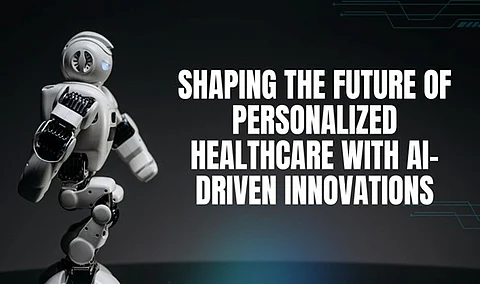

AI is transforming healthcare in ways never seen before, from creating personalized treatment plans to optimizing clinical operations. But that's not all—this technology is addressing complicated data challenges, improving ethical norms, and opening the way for a future in which treatment is more than merely reactive, but highly individualized. In this article, you will explore more about the insights given by Chandra Sagili, a seasoned expert in client-server technology solutions, who takes us on a fascinating journey into the world of artificial intelligence (AI) and its game-changing impact on personalized medicine.
He states that personalized medicine represents a shift in healthcare from generalized treatment approaches to solutions that are tailored to individual patient profiles and conditions. And AI is critical in this shift, processing massive amounts of genomic data, clinical biomarkers, and electronic health records (EHRs) with unparalleled precision and scalability. Modern algorithms attain accuracy rates of more than 95%, allowing for more reliable disease detection, therapeutic planning, and proactive healthcare measures that reduce risks and increase treatment workflow efficiency.
In addition, Chandra says that AI-powered systems are altering diagnostic methods and risk assessment with the help of machine learning and deep learning technology in novel ways. These systems analyze both organized and unstructured data, including clinical notes, imaging results, patient histories, and lab data, to identify patterns and anomalies that might otherwise go undetected by human observation or traditional diagnostic procedures. Risk prediction models for disorders such as cardiovascular disease and diabetes achieve accuracy rates of more than 90%, considerably enhancing early identification, minimizing complications, and improving patient outcomes via data-driven intervention strategies.
Moreover, it is possible that AI can influence therapy optimization, where it assesses patient-specific data to estimate treatment outcomes and identify potential hazards to medicines. To be precise, algorithms use genetic markers, pharmacological interactions, and historical data to prescribe medicines based on individual needs, ensuring precision and efficacy in critical situations. This technique reduces unpleasant reactions by 33%, increases adherence by 28%, and minimizes problems. Furthermore, real-time monitoring capabilities enable doctors to dynamically change treatment regimens, resulting in improved patient outcomes, increased satisfaction, and ongoing improvement in overall healthcare standards.
AI deployment in healthcare requires a strong infrastructure to manage the massive computational and storage demands of genomic and clinical data integration. Systems must enable seamless connectivity across departments and organizations, ensuring accessibility while adhering to strict data security regulations for compliance and dependability. Healthcare facilities have reduced diagnosis times by 43% using AI-powered platforms while maintaining accuracy and quality of care, highlighting the importance of scalable, secure, and efficient infrastructure in driving technological innovation and transformative practices in personalized medicine.
Integrating AI into healthcare creates significant ethical and regulatory difficulties that necessitate comprehensive solutions for successful and responsible adoption. Protecting data privacy, correcting algorithmic biases, and ensuring openness in decision-making processes are critical for establishing confidence between patients and providers while adhering to ethical standards. Research shows that using strong validation frameworks, stringent regulatory adherence metrics, and well-defined ethical norms can reduce biases by up to 64%, enabling equal treatment across varied groups. Furthermore, enhanced regulatory compliance systems have expedited healthcare operations, lowering clearance times by 39% and increasing conformity to international standards, boosting the consistency, accountability, and general reliability of AI-driven healthcare solutions.
He also says that technologies such as advanced neural networks and adaptive learning algorithms, have the potential to transform healthcare with unparalleled precision, efficiency, and innovation. These solutions offer faster data processing, increased diagnostic accuracy, and more efficient resource utilization, allowing healthcare institutions to confidently meet increasing demands. Additionally, significant advances in quantum computing, federated learning, and enhanced data integration approaches are expected to overcome current constraints, enabling more intelligent, scalable, and holistic healthcare solutions. You may also get the complete benefit of AI-driven systems across multiple medical disciplines through structured training programs for clinicians, which enables seamless adoption, and operational excellence.
To conclude, Chandra Sagili emphasizes AI's disruptive promise in personalized medicine, highlighting its unrivaled ability to increase diagnostic accuracy, optimize treatments, improve patient outcomes, and revolutionize clinical operations in unprecedented ways. The future of global healthcare is being reshaped by the seamless fusion of advanced AI, ethical responsibility, and cutting-edge infrastructure. When paired with comprehensive training and strategic frameworks, these innovations unlock new levels of precision, accessibility, and efficiency—ensuring equitable care for all. However, success won’t happen in isolation. True transformation will come through collaboration, as technologists, clinicians, and policymakers join forces to navigate challenges, break down barriers, and create a smarter, more inclusive healthcare system for the world.
